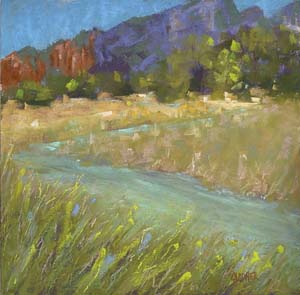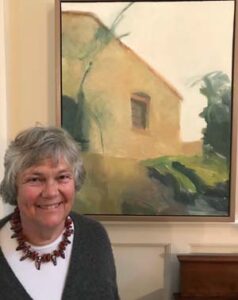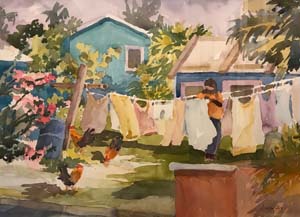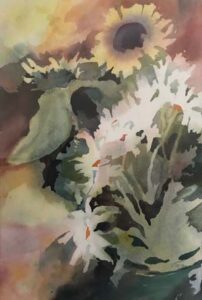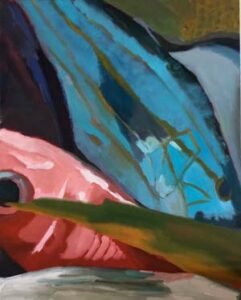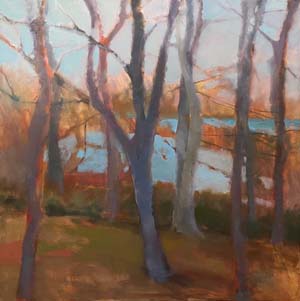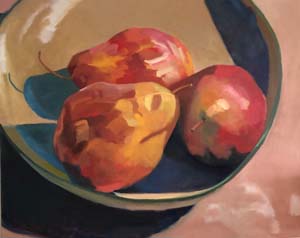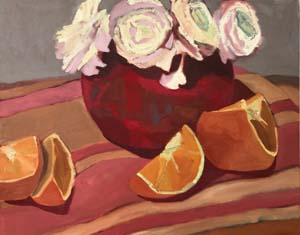August Artist of the Month
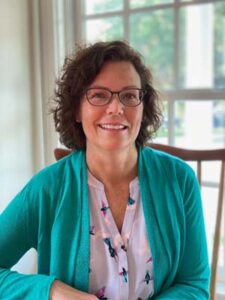
Meet Kate Heald
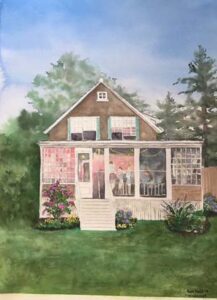 Kate Heald grew up with her two sisters and two brothers in the country in Uxbridge, Massachusetts. “We did everything together and my parents gave us opportunities to try many activities. Something different stuck for each of us. For me, it was art, I’ve been a life long artist ever since I was a little one. It has always been my outlet.” Heald recalls her favorite gift ever was a big box of art supplies with various new papers, brushes, tools and mediums: “a menagerie of wonderful new things.” At Wheaton College she planned on majoring in chemistry or biology but was enthralled with her academic drawing course and considered biological illustration. She decided to go all in on art and graduated as a Studio major with a minor in Art History. She has taken classes at the MFA both during and after college.
Kate Heald grew up with her two sisters and two brothers in the country in Uxbridge, Massachusetts. “We did everything together and my parents gave us opportunities to try many activities. Something different stuck for each of us. For me, it was art, I’ve been a life long artist ever since I was a little one. It has always been my outlet.” Heald recalls her favorite gift ever was a big box of art supplies with various new papers, brushes, tools and mediums: “a menagerie of wonderful new things.” At Wheaton College she planned on majoring in chemistry or biology but was enthralled with her academic drawing course and considered biological illustration. She decided to go all in on art and graduated as a Studio major with a minor in Art History. She has taken classes at the MFA both during and after college.
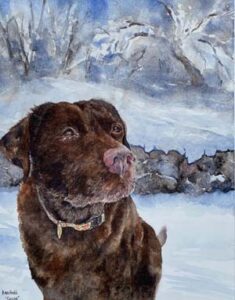 After graduating, Heald looked for a job in the art world but soon realized that she could not support herself working at a gallery so took a corporate job at a technology research company, AMR Research, where she worked for eight years: she always painted on the side. “I have always left my art area set up, I like things neat and tidy so I can easily do something daily. If I don’t have time to work on a painting, I’ll make something small, like a card.” Heald married and became a busy stay-at-home mom for her 2 daughters for 19 years. She brought her skills to the volunteer circuit doing everything from room parent to CCD teacher to fundraiser. During this time, she did a lot of commission work and as her children got older began taking classes again.
After graduating, Heald looked for a job in the art world but soon realized that she could not support herself working at a gallery so took a corporate job at a technology research company, AMR Research, where she worked for eight years: she always painted on the side. “I have always left my art area set up, I like things neat and tidy so I can easily do something daily. If I don’t have time to work on a painting, I’ll make something small, like a card.” Heald married and became a busy stay-at-home mom for her 2 daughters for 19 years. She brought her skills to the volunteer circuit doing everything from room parent to CCD teacher to fundraiser. During this time, she did a lot of commission work and as her children got older began taking classes again.
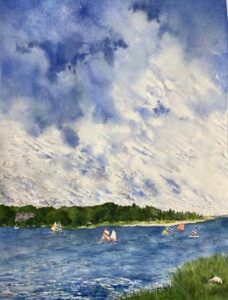 Some of Heald’s most important mentors have been her professor and advisor in college, Vaino Kola and her first art teacher Margaret Kalousdian. Kalousdian “had such a compassionate and wonderful way of explaining things and she taught me to never skip any steps in my drawing to painting process. She had a cork cylinder and everyone new to her studio learned to draw it at their first class: These core principles really stuck.” Watercolor also stuck for Heald: “I love the fast pace of (it), I don’t like to wait for other painting mediums to dry. Although I am a fairly controlled painter, the flow of watercolor allows for the unexpected.” Her subjects “are derived from things I love: beautiful flowers, landscapes, pets…something that catches my eye and brings me joy; I’m always saying, “Hang on, I have to take a picture
Some of Heald’s most important mentors have been her professor and advisor in college, Vaino Kola and her first art teacher Margaret Kalousdian. Kalousdian “had such a compassionate and wonderful way of explaining things and she taught me to never skip any steps in my drawing to painting process. She had a cork cylinder and everyone new to her studio learned to draw it at their first class: These core principles really stuck.” Watercolor also stuck for Heald: “I love the fast pace of (it), I don’t like to wait for other painting mediums to dry. Although I am a fairly controlled painter, the flow of watercolor allows for the unexpected.” Her subjects “are derived from things I love: beautiful flowers, landscapes, pets…something that catches my eye and brings me joy; I’m always saying, “Hang on, I have to take a picture
For the past several years Heald has been working for Caskata, a local company that sells beautiful dinnerware, glassware and linens for the tabletop. She initially started in the decorating studio where she decorated porcelain plates by hand. In the last year the company has outsourced this work due to the inability to source raw goods necessary to make the wares in-house. Heald’s role at the company has grown along with the company and they are just about to move their headquarters to the old Stuart Swan building in Wellesley.
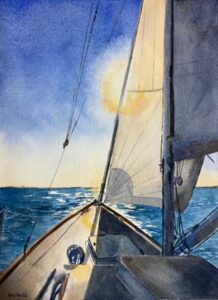
Heald is an exhibiting member of the WSA and the Falmouth Artist Guild, where they also have a home. She exhibits at the Falmouth Art Center, West Falmouth Library and the South Shore Art Center. She treasures her group The Watercolor Connection in Natick: “It’s a wonderful group of artists (all women now); before the pandemic we met at St. Paul’s Church in Natick had lunch and painted together.” Heald has moved away from commission work and paints “mostly for myself: I try to bring out what initially caught my eye, something much more than what I see in the iPhone picture. The photo is never the same as what is in my eye.”

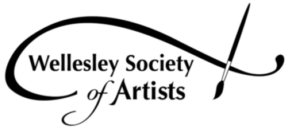
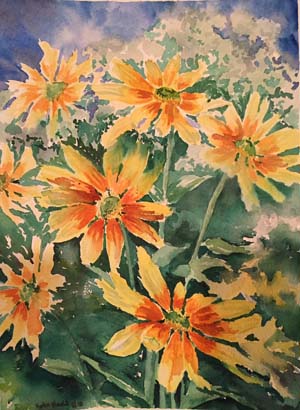
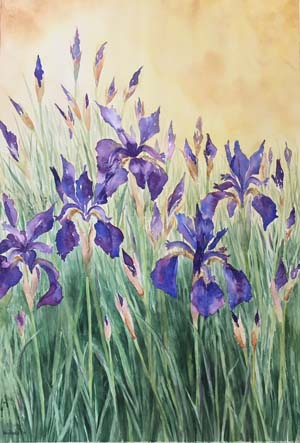
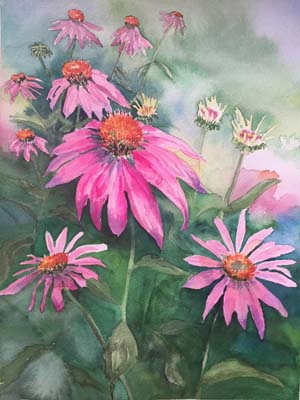
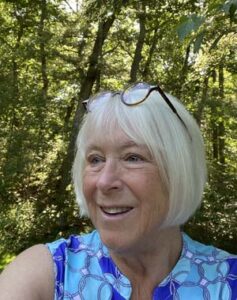
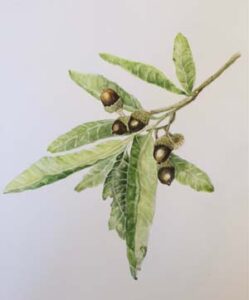
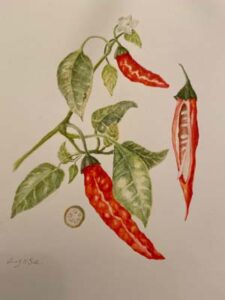 When her boys left for college, Sur was ready for a new venture. The call to botanical art was still strong and she began studying with Friends of Wellesley College Botanic Gardens where she earned her certificate in Botanical Art and Illustration. “Learning to really look at my subjects with a far more observant eye is critical to the integrity of my artwork, and I continue to work on that skill.” She explains that in botanical art “the scientific principles must be correct.” She often shows her subjects in “various stages of their growing cycle; seeds, nuts, buds and leaves all capture what the particular plant is ‘about.’ And then the challenge is to make a beautiful piece of art by capturing the light and shadow, finding the right color mixes, and making an interesting composition.”
When her boys left for college, Sur was ready for a new venture. The call to botanical art was still strong and she began studying with Friends of Wellesley College Botanic Gardens where she earned her certificate in Botanical Art and Illustration. “Learning to really look at my subjects with a far more observant eye is critical to the integrity of my artwork, and I continue to work on that skill.” She explains that in botanical art “the scientific principles must be correct.” She often shows her subjects in “various stages of their growing cycle; seeds, nuts, buds and leaves all capture what the particular plant is ‘about.’ And then the challenge is to make a beautiful piece of art by capturing the light and shadow, finding the right color mixes, and making an interesting composition.”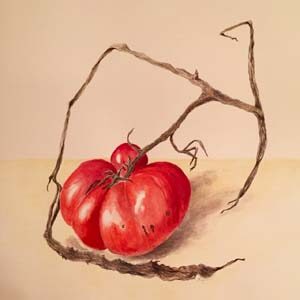
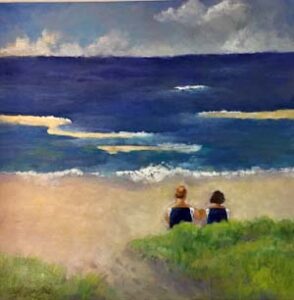
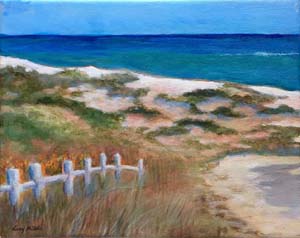
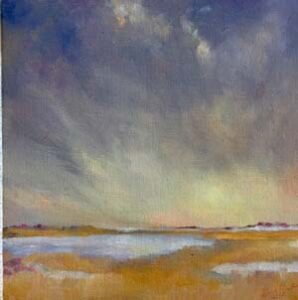
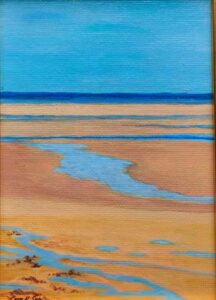
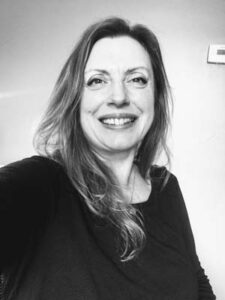
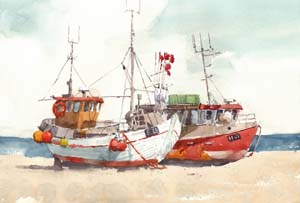
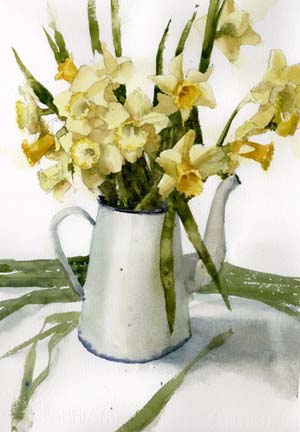
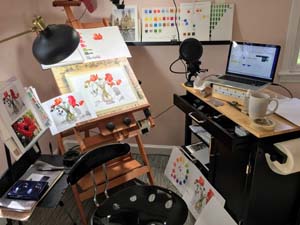
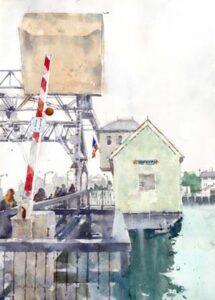
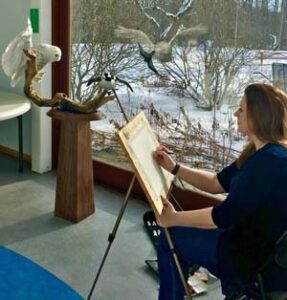
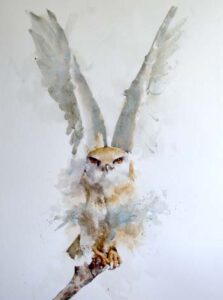
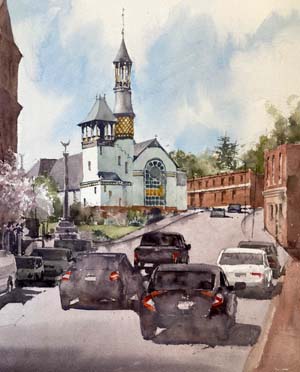
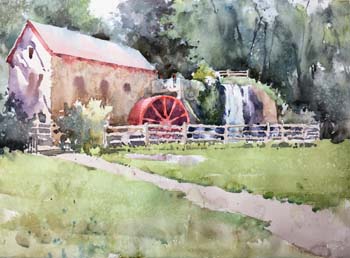
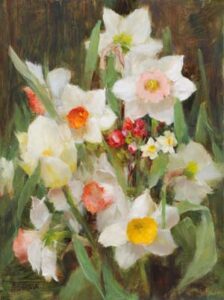 The long anticipated Wellesley Society of Artists (WSA) and Needham Art Association (NAA) annual joint demo originally scheduled for spring 2020, finally happened a year later via Zoom. Although most would have preferred to see Kathy paint in person, everyone got a front row seat and attendees far and wide were able to join the program.
The long anticipated Wellesley Society of Artists (WSA) and Needham Art Association (NAA) annual joint demo originally scheduled for spring 2020, finally happened a year later via Zoom. Although most would have preferred to see Kathy paint in person, everyone got a front row seat and attendees far and wide were able to join the program. 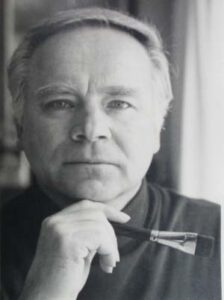
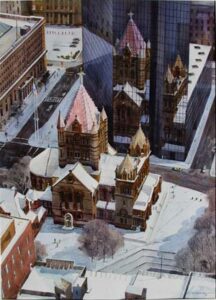
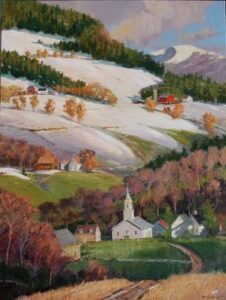
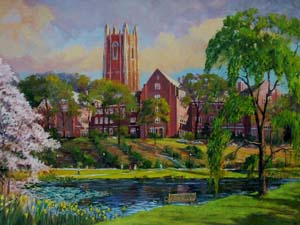
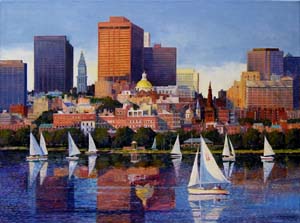
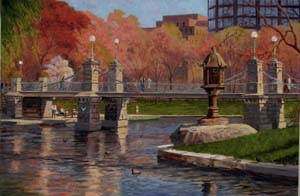
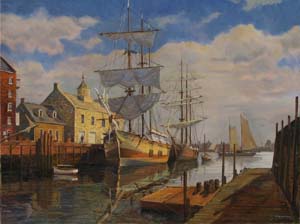
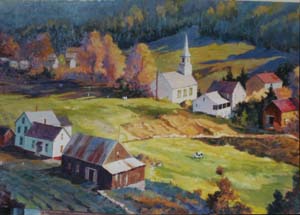
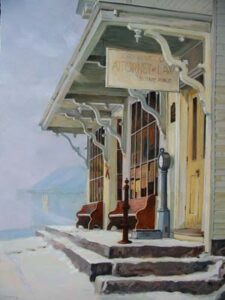
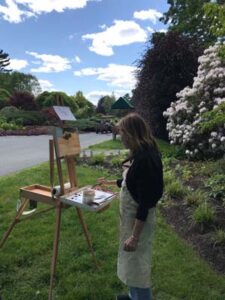
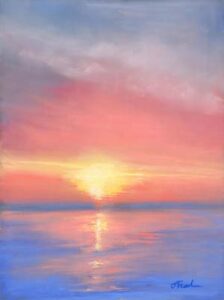 Jodi Traub recalls a few early art memories. When her uncle lived with her family for a while he painted and allowed her to watch if she “was quiet,” and she was up to the task of sitting and watching for hours. At a very young age, her teacher called her parents to say that she was very talented at drawing. When her family moved from the North Shore of Massachusetts to Southern Florida, her mother found her an art teacher to ease the disappointment of an early teenage relocation. Art has always been a refuge for Traub who came back to the Boston area to attend Brandeis University where she received a BA in Fine Arts and Education.
Jodi Traub recalls a few early art memories. When her uncle lived with her family for a while he painted and allowed her to watch if she “was quiet,” and she was up to the task of sitting and watching for hours. At a very young age, her teacher called her parents to say that she was very talented at drawing. When her family moved from the North Shore of Massachusetts to Southern Florida, her mother found her an art teacher to ease the disappointment of an early teenage relocation. Art has always been a refuge for Traub who came back to the Boston area to attend Brandeis University where she received a BA in Fine Arts and Education.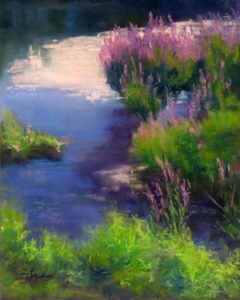
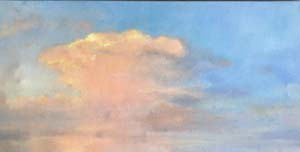
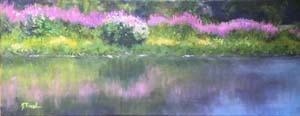
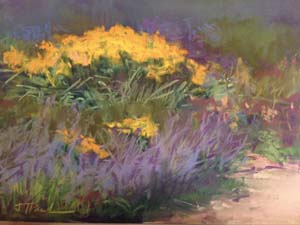 She has had her work represented in L’attitude Gallery on Newbury Street (now in the South End of Boston) and at The Green Heron Gallery in Ogunquit, Maine until it closed due to COVID. She had her work accepted into a corporate installation at Milton Hospital. She has won numerous awards and done many one person and group exhibitions, including juried shows. She is a member of the WSA, where she reviews new members’ entries and works on exhibitions. She was a featured artist on “Art Beat,” a local show for Cable TV. For Traub the silver lining of the pandemic was that she has had more time to paint: “It’s my peace, my time for me. I don’t think of anything else when I’m painting…It’s the thing I look forward to most each day.” Her work has been described as peaceful and she hopes that her paintings bring a sense of serenity to the viewer.
She has had her work represented in L’attitude Gallery on Newbury Street (now in the South End of Boston) and at The Green Heron Gallery in Ogunquit, Maine until it closed due to COVID. She had her work accepted into a corporate installation at Milton Hospital. She has won numerous awards and done many one person and group exhibitions, including juried shows. She is a member of the WSA, where she reviews new members’ entries and works on exhibitions. She was a featured artist on “Art Beat,” a local show for Cable TV. For Traub the silver lining of the pandemic was that she has had more time to paint: “It’s my peace, my time for me. I don’t think of anything else when I’m painting…It’s the thing I look forward to most each day.” Her work has been described as peaceful and she hopes that her paintings bring a sense of serenity to the viewer.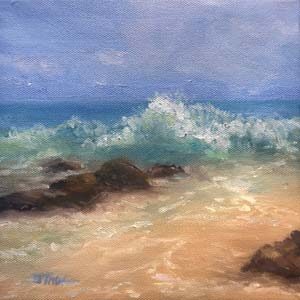
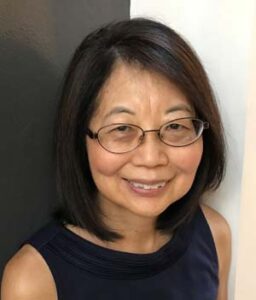
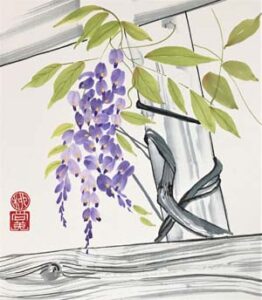 Naomi Wilsey grew up in Colorado in a Japanese American family. Her love of art began quite young. “When I was five, I was home a lot with my grandmother in Denver and I would watch a sumi-e or Japanese brush painting show. I was influenced a great deal by my grandparents who lived in Hawaii, my grandfather was a Japanese brush painter, photographer, and Bonsai expert and my grandmother taught Japanese and Japanese flower arrangement.” In high school, Wilsey was president of the Art Club: “though it can be quite solitary, I always loved being able to share art with others” and she has done so all of her life. She received a Bachelor of Arts in Fine Art and Education from the University of Colorado and was certified as a public school art teacher. Wilsey and her husband moved to the East Coast after college and she began teaching art. While she gained knowledge of most media in art education, Wilsey primarily paints in watercolor and sumi-e (Japanese brush painting), and paints traditional landscapes, still life and florals.
Naomi Wilsey grew up in Colorado in a Japanese American family. Her love of art began quite young. “When I was five, I was home a lot with my grandmother in Denver and I would watch a sumi-e or Japanese brush painting show. I was influenced a great deal by my grandparents who lived in Hawaii, my grandfather was a Japanese brush painter, photographer, and Bonsai expert and my grandmother taught Japanese and Japanese flower arrangement.” In high school, Wilsey was president of the Art Club: “though it can be quite solitary, I always loved being able to share art with others” and she has done so all of her life. She received a Bachelor of Arts in Fine Art and Education from the University of Colorado and was certified as a public school art teacher. Wilsey and her husband moved to the East Coast after college and she began teaching art. While she gained knowledge of most media in art education, Wilsey primarily paints in watercolor and sumi-e (Japanese brush painting), and paints traditional landscapes, still life and florals.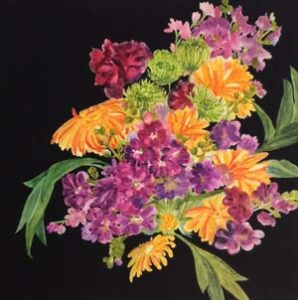
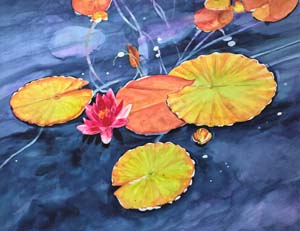 Although retired, Wilsey does a great deal of volunteer work and is currently serving as President of the Dedham Art Association (DAA). She is a past co-president of the Needham Art Association and an exhibiting member of the Wellesley Society of Artists. She loves to enrich her community and still enjoys sharing her art with others. She does all of the workshops offered at DAA and is in a weekly painting group, now meeting through texting. Wilsey is on the Board of Needham Open Studios, where she enjoys having an open house, doing demos and preparing hands-on projects for her attendees. She has exhibited with the Rhode Island and the New England Watercolor Society and has exhibited at Gallery Twist in Lexington.
Although retired, Wilsey does a great deal of volunteer work and is currently serving as President of the Dedham Art Association (DAA). She is a past co-president of the Needham Art Association and an exhibiting member of the Wellesley Society of Artists. She loves to enrich her community and still enjoys sharing her art with others. She does all of the workshops offered at DAA and is in a weekly painting group, now meeting through texting. Wilsey is on the Board of Needham Open Studios, where she enjoys having an open house, doing demos and preparing hands-on projects for her attendees. She has exhibited with the Rhode Island and the New England Watercolor Society and has exhibited at Gallery Twist in Lexington.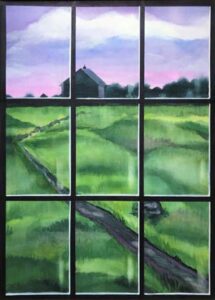 Wilsey is very grateful for her home in Needham where she was able to build a large studio to paint and teach. In this Victorian oasis, she and her husband also enjoy their Japanese Tea Room which is used for meditation and tea ceremonies. Another great love for Wilsey is plein air painting because “it combines my love of nature and art.” While she has “made the best of it” during the pandemic, she longs for the days where she can go outside and paint with groups of artists
Wilsey is very grateful for her home in Needham where she was able to build a large studio to paint and teach. In this Victorian oasis, she and her husband also enjoy their Japanese Tea Room which is used for meditation and tea ceremonies. Another great love for Wilsey is plein air painting because “it combines my love of nature and art.” While she has “made the best of it” during the pandemic, she longs for the days where she can go outside and paint with groups of artists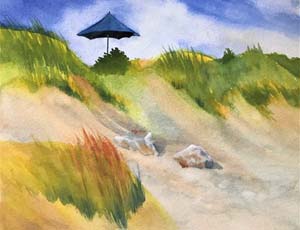
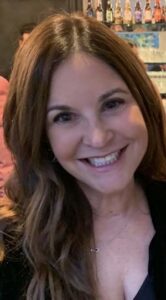
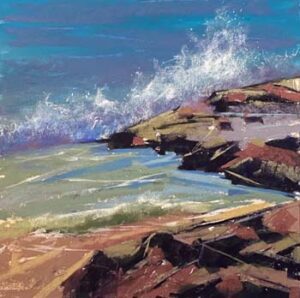
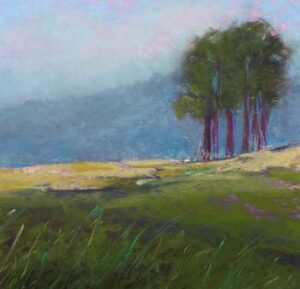
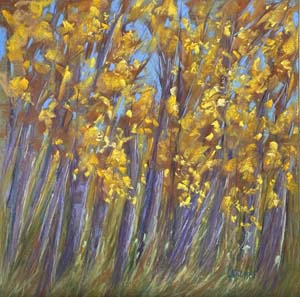
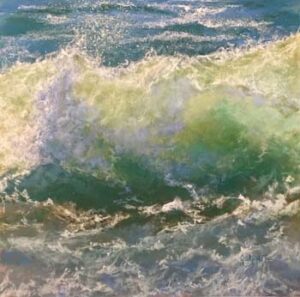
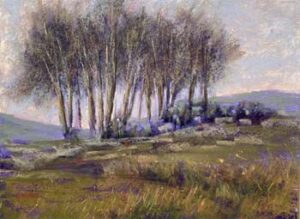 Gardner has a lot of wisdom to pass on to new painters: “Some of my best learning moments were from my worst paintings. I look to the paintings that don’t work quite right and learn from them. They teach me to observe more closely, to sit back and figure out why something doesn’t work. I also have a rule for workshops which I call the “No Masterpiece Rule.” This reminds me that workshops are for learning new techniques and not for making masterpieces. I think a lot of artists feel pressure to perform in workshops. Once I used the ‘learning lens” philosophy, workshops became much more enjoyable. Another thing that works for me is having very low expectations when submitting work to shows. I know that judging art is very subjective and I don’t get hung up on whether I get in a show or not. I have a very laid-back attitude about it which is probably the California side of my personality coming out.” Gardner also offers these three pearls of wisdom: “The keys to success for me have been having a daily painting practice, observing my subject matter for hours on end and having fun in my studio.”
Gardner has a lot of wisdom to pass on to new painters: “Some of my best learning moments were from my worst paintings. I look to the paintings that don’t work quite right and learn from them. They teach me to observe more closely, to sit back and figure out why something doesn’t work. I also have a rule for workshops which I call the “No Masterpiece Rule.” This reminds me that workshops are for learning new techniques and not for making masterpieces. I think a lot of artists feel pressure to perform in workshops. Once I used the ‘learning lens” philosophy, workshops became much more enjoyable. Another thing that works for me is having very low expectations when submitting work to shows. I know that judging art is very subjective and I don’t get hung up on whether I get in a show or not. I have a very laid-back attitude about it which is probably the California side of my personality coming out.” Gardner also offers these three pearls of wisdom: “The keys to success for me have been having a daily painting practice, observing my subject matter for hours on end and having fun in my studio.” 